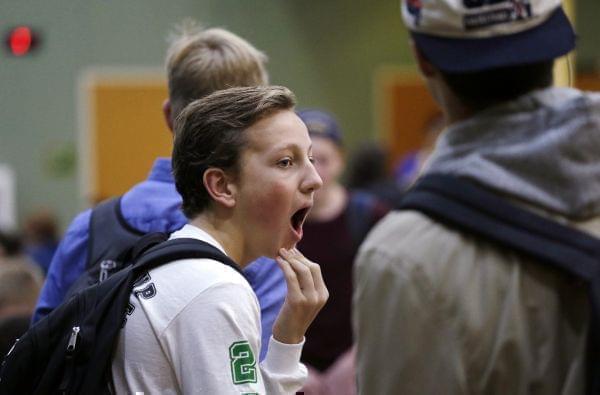Should School Start Later?; How Illinois Handles ‘Revenge Porn’; The Case For Majoring In The Humanities

Sophomore Ben Early yawns as he stands in his school cafeteria before classes at Roosevelt High School in Seattle. California recently became the first state to require later school start times. Elaine Thompson/AP
Researchers who study sleep say teens aren’t getting enough of it and say schools can do more to help by having class start later. We hear from a sleep scientist and an Illinois school district that has moved to later start times. Plus, advocates say they’re seeing an increase in so-called ‘revenge porn’ cases: when intimate images are shared without a person’s consent. But they also say Illinois leads the way when it comes to addressing this issue. And, the number of college students majoring in the humanities has hit its lowest level in decades. But what are we at risk of losing when students flock from English to STEM related courses?
Later School Start Times And Adolescent Sleep
Getting enough sleep is a challenge for all of us. But it can be especially difficult for teenagers. Up late and up early the next day, a lack of sleep for high schoolers can leave them drowsy, unable to concentrate, anxious and even depressed.
According to the CDC, less than 20% of middle school and high school students start the day after 8:30 a.m. even though research shows that starting school later can make kids healthier, more alert and even safer.
California just became the first state to require later school start times: no earlier than 8 a.m. for middle school and no eariler than 8:30 a.m. for high schoolers.
We caught up with McLean County School District Unit 5 Superintendent Mark Daniel. Back in 2016, Unit 5 pushed the start time back for their high school and junior high students.
We also spoke with Dr. Jennifer Martin, a member of the board of directors for the American Academy of Sleep Medicine. She’s also a professor at the David Geffen School of Medicine at UCLA in California.
“Getting enough sleep is one of the critical pillars of maintaining heath,” explains Dr. Jennifer Martin @AASMorg.
— The 21st (@21stShow) November 5, 2019
She says rates of insufficient sleep are actually higher in young people than adults --> 2/3 don't get the sleep they need (8-10 hours per night)
How Illinois Handles Revenge Porn
Millions of Americans suffer from domestic abuse or intimate partner violence every day. In more recent years, at least anecdotally, more Americans have encountered a type of abuse that’s often called nonconsensual pornography or, “revenge porn.”
That’s when an image of a person — usually sexually explicit in nature — is circulated online without their consent.
Most recently, this issue has reached even the halls of Congress. A case of nonconsensual pornography led, in part, to the resignation of U.S. Representative Katie Hill from California.
Illinois is one of 11 states that considers revenge porn a felony and advocates say that our state might actually be getting it right when it comes to addressing this issue.
Danielle Parisi Ruffatto is director of emergency services for Ascend Justice, an organization in Chicago that provides services for people affected by gender-based violence. Jane Anderson is an attorney advisor with the non-profit Aequitas. She’s also a former prosecutor from Miami-Dade County.
Jane Anderson (@AEquitasResourc) says we should be re-framing this issue. "Take the spotlight off of the victim... make sure we're remaining offender focused."
— The 21st (@21stShow) November 5, 2019
The Case For Humanities Majors
The number of American students majoring in humanities fields has hit its lowest level in decades as students have been lured away from English and history courses to science, technology and math, with the hopes of higher-paying jobs after graduation.
Between 2009 and 2017 is when we saw the biggest decline in English majors: a 25% drop. That’s according to the latest numbers from the National Center for Education Statistics.
Now, calls are coming from unlikely places, including some of the world’s leading economists, to reverse this trend and encourage students to study the humanities once again.
Professor Lendol Caldder teaches history at Augustana College, a private liberal arts college in Rock Island. Professor Joseph Walwik is the faculty chair of Social Sciences and Human Services at Parkland College, a public community college in Champaign.
"They see STEM fields as leading to certain types of jobs, and while that's true to a certain extent," says Joseph Walwik (@parklandcollege), "they shy away from classes like history or philosophy which will actually help them do their jobs better in the long run."
— The 21st (@21stShow) November 5, 2019
